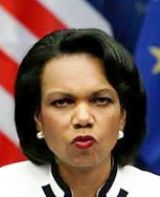Rice says US could send ambassador to Sudan again
By Saul Hudson
DAKAR, July 20 (Reuters) – U.S. Secretary of State Condoleezza Rice held out the possibility of sending an ambassador to Sudan for the first time since 1997, in a sign of improving ties after the installation of a new government.
 “We are looking to the day when we can put (ambassadorial) representation there, because obviously things are moving pretty quickly in Sudan,” Rice told reporters en route to Senegal, where she arrived on Wednesday on her first trip to the continent as secretary of state.
“We are looking to the day when we can put (ambassadorial) representation there, because obviously things are moving pretty quickly in Sudan,” Rice told reporters en route to Senegal, where she arrived on Wednesday on her first trip to the continent as secretary of state.
Leaders of a coalition peace government were sworn in on July 9. That marked a new era after two decades of north-south civil war and raised the prospect of better ties with Washington despite U.S. accusations Sudan has aided genocide and been a sponsor of terrorism.
The return of a U.S. ambassador would show international acceptance of the Khartoum government, something which Sudan’s leaders covet, U.S. officials say.
But Rice said such a move would depend on Khartoum resolving a conflict in the western region of Darfur and being removed from a U.S. list of state sponsors of terrorism.
At a news conference in Dakar, she said she would demand on a visit to Khartoum and Darfur on Thursday that Sudanese leaders act to stop the violence, which she called genocide.
“I will start from the point it could also be a new day if this new government … exercises its responsibility toward all the people of Sudan, including the people of Darfur,” she said.
“We don’t rely on words, we rely on actions,” she added. “We have gotten some help from the Sudanese government but by no means enough.”
Violence has abated this year in Darfur, after tens of thousands of people died and about 2 million were driven from their homes following a rebel uprising in early 2003.
Washington last year accused President Omar Hassan al-Bashir’s government of helping militia commit genocide in Darfur.
Senegal’s Foreign Minister Cheikh Tidiane Gadio said his government was “totally dissatisfied” at the African Union’s failure to stop the killing despite sending troops to the region.
“Those militias are still very active, killing people, burning villages, raping women,” he said, standing alongside Rice.
HOST TO BIN LADEN
The United States hopes a new vice president — former southern rebel John Garang, who has frequently visited Washington — will help improve ties between the two countries.
Ambassador Tim Carney left Khartoum in 1997 after the United States imposed sanctions on Sudan for what it said was its support for terrorism. The top U.S. representative in the country is a charge d’affaires.
Frosty U.S. ties with Khartoum, where Osama bin Laden lived from 1991 to 1996, reached a low in 1998 when Washington launched missiles to destroy a pharmaceuticals plant it said was linked to the al Qaeda leader and was making ingredients for chemical weapons.
Rice’s top diplomat for Africa, Connie Newman, said a carrot-and-stick policy was needed for Sudan, which had responded last year to pressure over Darfur because it did not want to be a pariah state.
Rice, who noted a threat of U.N. sanctions remained, said it was difficult to balance the goal of helping establish a new government with that of trying to hold Sudan accountable for atrocities in Darfur.
“I’ll admit that it is not the easiest thing to manage,” she said.
